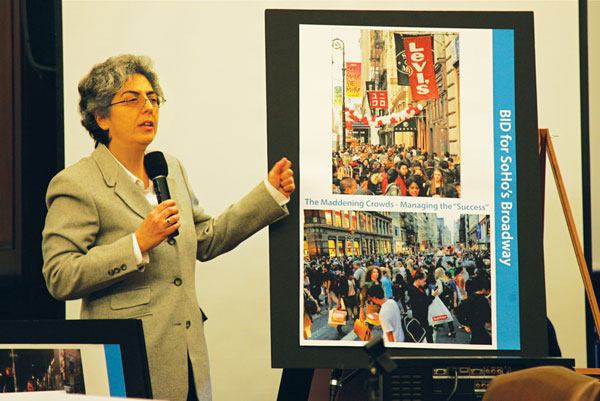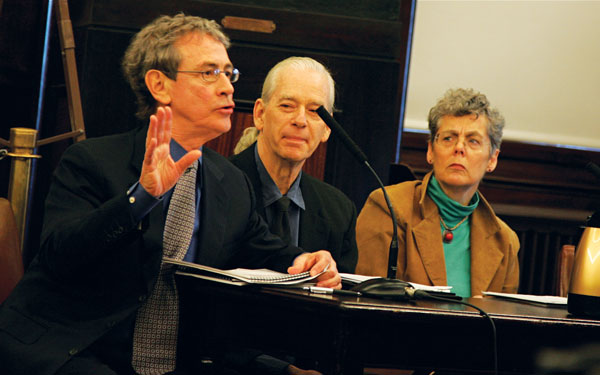
BY SAM SPOKONY | The heated debate over the proposed Broadway Soho Business Improvement District — which, amidst various changes to its plan, has been floating in limbo for three years — continued on Tuesday at a public hearing before the City Council’s Committee on Finance.
Also, a leading member of the opposition to the BID has provided this newspaper with documents revealing that an outspoken member of the BID’s steering committee was convicted of financial fraud — a felony charge — in his previous career as a lawyer.
Very little seems to have changed over time in terms of the support for and opposition to the Soho BID proposal, which seeks to encompass about 280 properties along Broadway between Houston and Canal Sts.
Advocates claim that a BID will be the only effective solution to problems facing that increasingly crowded stretch of blocks — specifically, traffic and pedestrian safety, overflowing garbage cans and trash-covered streets, large numbers of street vendors who fail to operate within city regulations, and infrastructure in need of repairs.
Those opposed to the plan claim just the opposite — that the BID would create an unnecessary tax burden on many community members, and that the above problems could be adequately taken care of through relationships between property owners, businesses, Community Board 2, city agencies, law enforcement and other civic organizations.
A business improvement district is essentially a public-private partnership that collects annual fees from property owners to pay for local improvements.
The BID’s current plan would set its first annual budget at $550,000. Originally, that figure was planned to be $700,000, but it was scaled back last year after widespread community opposition.
Owners of commercial and mixed-use properties in the district would pay the BID an average of roughly $6,700 per year under the current plan; owners of commercial ground-floor condo units would pay an average of nearly $3,000 per year; and owners of commercial upper-floor condo units would pay an average of about $650.
Residential condos and co-ops would only be assessed a symbolic $1 annual fee under the current plan. In a previous version of the plan, residential co-ops would have been assessed similarly to commercial properties, but that was also changed last year.
Even though nearly 86 percent of the BID’s annual budget would come from owners of commercial and mixed-use rental properties, according to the city’s Department of Small Business Services, opponents of the plan maintain that it focuses too much on helping developers and corporations at the expense of small businesses.
“Why burden struggling small businesses on the upper floors to benefit Giorgio Armani on the bottom floor?” said Sean Sweeney, director of the community activist group the Soho Alliance, at Tuesday’s hearing.
Sweeney and his allies also strongly believe that, rather than looking out for the best interests of the neighborhood as a whole, the creators of the Broadway Soho BID merely wish to promote more tourism — even though proponents of the plan have repeatedly denied that outright, and have removed any mention of tourism from the current plans.

“But that’s their goal, even if they say it’s not,” said Peter Davies, another BID opponent, at the Council hearing. “It’s a bad plan that would pass costs on to tenants and divide our community.”
Barbara Cohen, a consultant for the BID, called Sweeney’s and Davies’s portrayals unfair and inaccurate, saying that the BID would play a vital role in identifying and serving the needs of a district that she characterized as “suffering a lot of abuse” from piled-up garbage and traffic congestion.
She also fired back against claims that the BID would only cater to developers or big business interests, saying that the BID’s planning committee is comprised equally of residential and commercial interests.
To that end, Margaret Chin — currently the only local elected official who supports the Broadway Soho BID — said in remarks at the start of the Council hearing that, if the BID is eventually approved, she believes property owners who are also Soho residents should be given greater voting power on the BID’s board of directors than nonresident property owners. An S.B.S. representative responded by saying that that arrangement would be unprecedented for a New York City BID, but that it could be explored in future talks between the Council, S.B.S. and the BID.
Brian Steinwurtzel, the chairperson of the BID’s steering committee, said at Tuesday’s hearing that the plan “doesn’t seem so controversial,” given the committee’s figures that show just slightly more than 80 percent support from tax lots that have responded to the city’s required ballots for BIDs, a so-called “needs assessment survey.”
In keeping with the generally inflammatory nature of the debate, Steinwurtzel went on to say that the BID would have received much more support by now, particularly from Community Board 2 and elected officials, if it weren’t for the “false claims” spread by Sweeney and his cohorts.
Brad Hoylman, the newly elected state Senator and former chairperson of C.B. 2, attended Tuesday’s hearing to speak forcefully against the BID proposal. Assemblymember Deborah Glick and state Senator Daniel Squadron sent similarly negative statements, which were read by aides.
Councilmember Domenic Recchia, chairperson of the Finance Committee, said on Tuesday that a final public hearing will likely be scheduled for January. After that, community members will have 30 days to submit statements for or against the BID proposal, before the Council finally votes on whether or not to approve the plan.
BID backer a convicted felon
After Tuesday’s hearing, Sweeney provided this newspaper with documents showing that Alan Ballinger, a member of the BID’s steering committee, was convicted of fraud in 1987.
Ballinger, who was formerly a New York State lawyer, pled guilty to a felony charge that resulted in him being immediately disbarred, according to legal documents that are also publicly available online.
The fraud charge stemmed from actions Ballinger took in 1984 and 1985 to gain about $500,000 in loans by providing false income tax returns, as well as fraudulently notarizing legal documents in order to expedite a $2.8 million loan, according to court documents. Ballinger faced a sentence of two months in prison, but ultimately received 60 days’ home detention. He was placed on probation for five years.
According to a decision written by a State Supreme Court judge, it was determined that Ballinger’s “fraudulent acts were motivated by greed.”
Last year Ballinger wrote several letters to The Villager in support of the BID, identifying himself as president of the condo board at 40 Mercer St.
Ballinger did not respond to a request for comment.

































